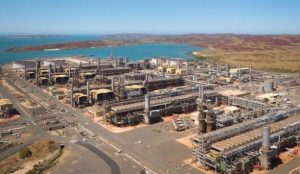Less than a day after the International Court of Justice issued its historic change ruling on Wednesday that countries are legally obligated to act on climate change and the impacts are already occurring.
In Sydney, the full bench of the New South Wales Court of Appeal struck down permission for an Indonesian company to extend the life of a huge coal mine at Mount Pleasant, near Muswellbrook in the Hunter Valley, for another 22 years after its approval expires next year, according to local media reports.
The decision by the NSW court on Thursday morning, less than 12 hours after the ICJ ruling in The Hague, delighted local environmentalists, but appears to be a significant blow for Mach Energy’s plan to expand Mt Pleasant into the country’s biggest coal mine. And climate advocates say it could have wider implications for many fossil fuel projects proposed in the state.
ALSO SEE: UN Court Lays Ground For Action Against Countries’ Climate Inaction
The court found that the NSW Independent Planning Commission was required to, but failed to consider the impacts of all emissions associated with the project on the local environment, including from the exported emissions – known as Scope 3 emissions – when the coal is sold and burnt overseas.
The proposed expansion would allow Mach Energy to mine an additional 247 million tonnes of coal by 2048. And that would generate emissions equivalent to 876 megatonnes of carbon dioxide, according to planning documents, almost all of which would be from customers burning the coal overseas.
The Denman Aberdeen Muswellbrook Scone Healthy Environment Group (DAMSHEG) launched an initial legal challenge against the extension of the coal mine in the Land and Environment Court last year, which was unsuccessful.
But its second bid to kill the project saw the Court of Appeal rule in its favour on Thursday.
‘Climate disasters’
Group president Wendy Wales welcomed the ruling, saying the burning of fossil fuels was causing increasingly destructive weather events globally, including in New South Wales.
“Our communities are enduring increasingly terrifying climate disasters, and nature is disappearing before our very eyes. Yet our governments are continuing to throw fuel on the fire by approving massive new coal projects like MACH Energy’s Mount Pleasant,” she was quoted as telling The Guardian.
Wales told the ABC people near the mine wanted the region to shift from reliance on fossil fuels. “We would like to see that Mount Pleasant doesn’t go through till 2048, doubling its rate of production,” she said.
The expansion of the coal mine, several hours north of Sydney, will now be reviewed by the Land and Environment Court.
The decision shows that legal challenges to such projects face far tougher legal consideration. An anti-fossil fuels group known as Lock The Gate has said there are 18 coal proposals at various stages in the NSW planning system.
Lawyers were split on the significance of the decision, with one saying the appeal court’s ruling related mainly to whether the planning body followed the correct process, rather than a merit-based judgement.
But Greg Bourne, a former president of BP Australasia who is now a director of the Climate Council, said the decision could turn out to be key to cutting Australia’s contribution to global warming.

Australia’s mixed record
Critics say the Federal government in Canberra ignored Scope 3 emissions in its approval in late May of the highly contentious North West Shelf gas project by Woodside in the north of Western Australia, which was allowed to operate until 2070.
It’s worth noting that the Albanese government has made strong progress in boosting solar and renewable energy over the past three years since it took power in 2022, but its approvals for gas and multiple coal projects have upset young Australians and green groups, despite the fact its record is far better than former Liberal-National party governments.
PV magazine reported last week that the Australian Energy Market Operator’s latest Connections Scorecard showed a surge in new generation and storage capacity, with 260 projects totalling 53 gigawatts going through the connection process in the National Electricity Market – an increase of close to 40% from the same time last year.
It said the renewable energy pipeline was expanding across every stage of the process and project sizes were also significantly bigger, thanks to “a surge in standalone batteries and hybrid solar-plus-battery projects.”
However, the North West Shelf gas project is a spectacular blot on Australia’s environmental record, given it is already the country’s third-highest emitting facility, producing about 6 million tonnes of greenhouse gas each year.
The big question now is whether environmental groups will challenge that decision in light of the ICJ ruling two days ago.
Analysts say the ICJ’s advisory judgement was very clear – the failure by countries to comply with the “stringent obligations” placed on them by climate treaties is a breach of international law.
So, expect more lawsuits. Lots more.
- Jim Pollard
ALSO SEE:
China Passes 1 Terawatt of Solar Power, Government Says
Bridge to Nepal Washed Away as Flash Floods Rock China
China’s Losses From Floods, Disasters in First Half: $7.6 Billion
India Renewable Power Output Jumps, Coal Use Falls in First Half
Floods Swamp Cities in Southwest China, And More Storms Due
Climate Chaos ‘Could Disrupt Half of Global Chipmaking by 2050’
Firms Underestimating Risks From Carbon-Fuelled Climate Change
Carbon Removals Not Growing Fast Enough For Climate Goals
Continued Fossil Fuel Investments Put $557 Trillion ‘At Risk’
Climate Change Cost China $32 Billion in Just One Quarter
Not a Single Asian Country Met Air Quality Standards in 2024
























